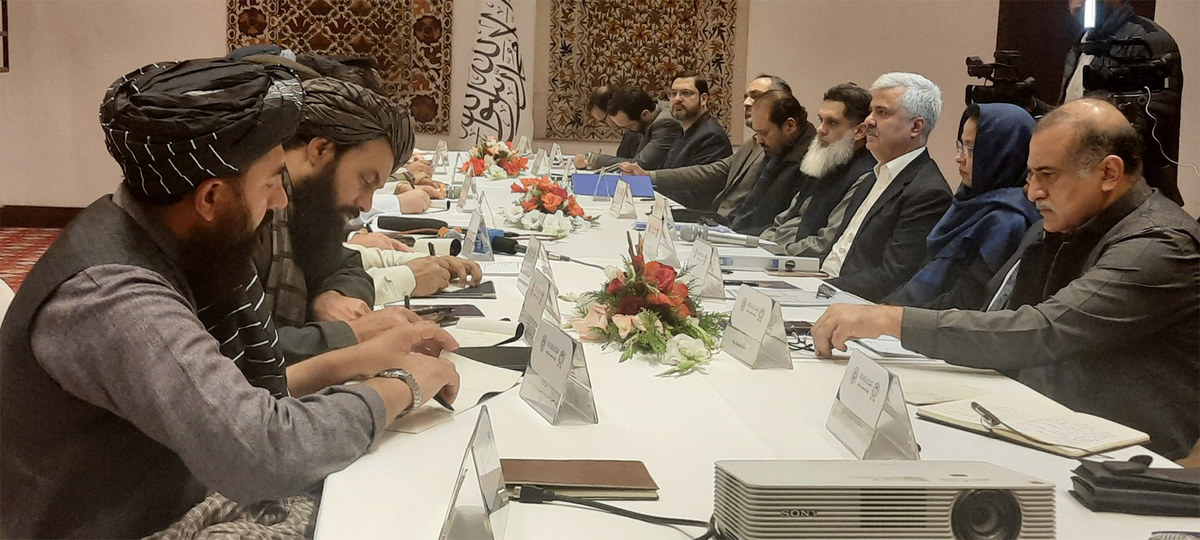Kabul/Peshawar: Afghans say access to international markets through Pakistan is still the most viable option for their landlocked country, as bilateral trade talks took place in Kabul this week to resolve obstructions amid heightened border tensions.
The neighboring countries have traded blame in recent months over who is responsible for a recent spate of militant attacks in Pakistan. Islamabad says the attacks are launched mostly from safe havens in Afghanistan.
Kabul’s ruling Taliban deny this and blame Islamabad for not being able to handle its own security challenges.
Tensions have also worsened as Islamabad began expelling more than a million undocumented foreigners, mostly Afghans, from Nov. 1 last year, amid the row over accusations that Kabul harbored Pakistani militants.
The situation has also led to economic losses, as key border crossings for trade and travel have been intermittently closed.
Pakistan’s delegation led by Commerce Secretary Khurram Agha arrived in Kabul on Monday for negotiations with the Taliban administration.
“God willing, the talks will lead to better results to encourage bilateral trade and businesses,” Akhundzada Abdul Salam Jawad, an Afghan commerce ministry spokesperson, told Arab News on Wednesday, adding that concrete details would come out after the conclusion of the talks.

Pakistan’s delegation led by Commerce Secretary Khurram Agha (right) is pictured holding talks with Afghan government (left) is Kabul, Afghanistan, on March 26, 2024. (@MoICAfghanistan/X)
The government of the landlocked country has repeatedly accused Pakistan of using access to its ports as a political leverage, curtailing efforts to revive the economy that has been reeling under international sanctions since mid-2021, when the Taliban took power.
Ziaulhaq Amarkhil, former governor of the Nangarhar province, which is linked with Pakistan’s Khyber Pakhtunkhwa province via the Torkham crossing, said that trade route was the most feasible one for Afghans in terms of time and costs.
“But unfortunately, the route has been politicized in recent years,” he told Arab News.
“Every time Afghan traders transfer more goods, they are blocked in Karachi port ... This has caused Afghan traders tremendous loss in the form of demurrage and their goods got rotten and wasted because of the delay.”
The ongoing negotiations are taking place also as Afghanistan has set sights on the Iranian port of Chabahar as an alternative to Pakistani ones.
The Taliban announced in late February a $35 million investment in Chabahar, which besides Pakistan’s Gwadar, Qasim and Karachi is the closest access point to the Indian Ocean for Afghanistan.
Amarkhil believes the Iranian port is the only way out of the deadlock with Islamabad.
“For a permanent solution, Afghanistan should expand the investment already done in Chabahar to connect the country with international markets even though it may require more time and investment,” he said.
But that solution was not likely to be available in the near future. Amin Stanekzai, economist and lecturer at the Rokhan Institute of Higher Education in Nangarhar, said the Iranian port could not be an alternative.
“Chabahar can be used to reduce pressure, but its potential as a complete replacement is currently limited,” he told Arab News.
“Afghanistan is heavily reliant on South Asian countries for imports, and in terms of cost and time, Qasim, Gawadar and Karachi ports are more viable options for Afghan traders.
Chabahar, on the other hand, can be used as a substitute to reduce the pressure, but it is currently less effective as a complete replacement.”
“PRACTICAL RESULTS”
Despite political tensions, bilateral trade ties remained vital for both the Afghan and the Pakistani economy.
Trade between the two countries amounted to $1.8 billion in 2022-23, according to Pakistan-Afghanistan Joint Chamber of Commerce data.

An Afghan security personnel stands guard as a truck arrives from Pakistan near the zero point Torkham border crossing between Afghanistan and Pakistan, in Nangarhar province on January 23, 2024. (AFP/File)
“Even though trade and political relations between Afghanistan and Pakistan have seen a lot of ups and downs in the last few decades, the level of trade and transit between the two countries is still on a high graph and this means that both countries can benefit from improving trade and transit relations,” Stanekzai said.
“Trade between Afghanistan and Pakistan is important because these two countries have historically been important trade and transit partners. If we look historically and socially, we know how close and dependent the economies of these two countries are.”
While there was bitterness among Afghan traders, there was hope on the ground for improvements.
Hajji Rohullah, an Afghan fruit and vegetable exporter, said the Pakistan route was “the most convenient way of doing exports and imports,” but it was difficult as the neighbor’s political situation was frequently changing and affecting trade.
“When the peak fruit or vegetable season arrives in Afghanistan, Pakistan makes sure to find a reason to close the border crossing.
Last year, hundreds of tons of vegetables got rotten in Torkham and Jalalabad because the door was closed without any prior notice,” he told Arab News.
“We need practical results ... We hope that the Islamic Emirate (of Afghanistan) can bring some improvements in the relations with Pakistan to support businesses and facilitate trade and transit.”
















